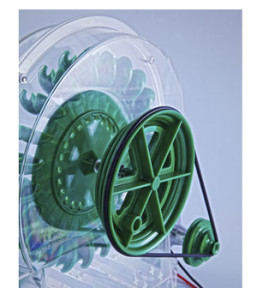 by: Ken Crawford
by: Ken Crawford
As I mentioned in my last blog, I had the opportunity to get in on the ground floor of introducing a new teaching tool called the PowerWheel. As a career social studies teacher and administrator, it has been a great experience to learn about a whole new area of academics…the teaching of energy and everything that goes along with it.
As we started to market the PowerWheel, one of the first things that we did was to bring together a group of teachers that represented all teaching levels…from the elementary to the post-secondary. Many of these teachers were not science teachers…or had limited science backgrounds. After giving them the chance to use the PowerWheel, we asked them, “How can we make the PowerWheel the most effective teaching tool it can be?”

Their answers were an eye-opener for us. It came down to variations on a single theme: Before we can use the PowerWheel effectively, we need to understand energy ourselves…then we can teach our students. It turns out that one of the greatest fears or limitations that some of the teachers had was the lack of their own knowledge. If given a chance to choose between a social studies lesson and a science lesson…they would choose the former…just because of comfort level.
From that moment on, we knew that we had an additional priority…help teach the teachers, and then effective learning about energy could take place. The PowerWheel is a great tool to help do this…easy to understand, and easy to use.
Here are three thoughts about teaching energy education in your classroom:
Read the rest of this entry »
 When it comes to thermal energy lessons, we are reminded of the potato chip slogan, “Nobody can eat just one.”
When it comes to thermal energy lessons, we are reminded of the potato chip slogan, “Nobody can eat just one.”


 Posted by Donna Giachetti
Posted by Donna Giachetti  To put it simply, we think thermal energy is cool! Many of our best-selling discrepant event demos are related to thermal energy, as you’ll see from the reviews below. With our
To put it simply, we think thermal energy is cool! Many of our best-selling discrepant event demos are related to thermal energy, as you’ll see from the reviews below. With our  Choosing a few compelling ice-breakers and discussion starters for the first week of school may not be a priority right now, but it’s never too early to jot down a few good ideas. We’ve compiled 20 ideas to help you start some lively science conversations next year.
Choosing a few compelling ice-breakers and discussion starters for the first week of school may not be a priority right now, but it’s never too early to jot down a few good ideas. We’ve compiled 20 ideas to help you start some lively science conversations next year. by: Ken Crawford
by: Ken Crawford
 by: Tami O’Connor – Taken From Litetronics
by: Tami O’Connor – Taken From Litetronics